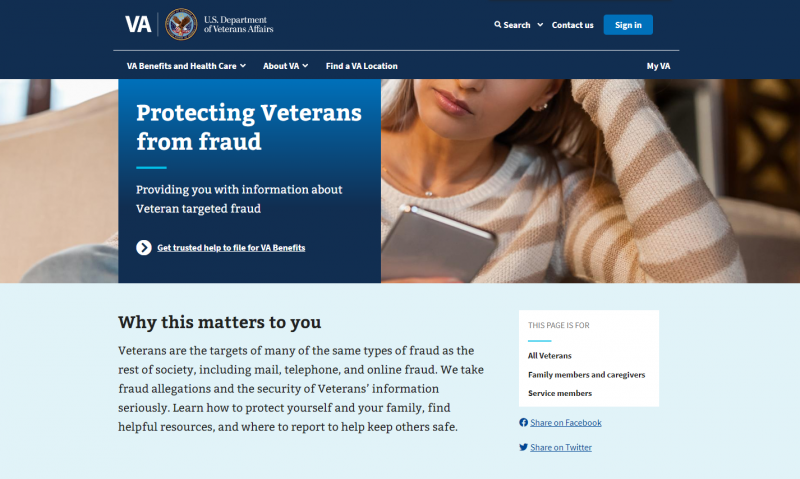
The VA has a fraud prevention website to help veterans, servicemembers and family members recognize, protect against and report fraud.
The Department of Veteran Affairs (VA) has a fraud prevention website, va.gov/vsafe, that provides resources for veterans, servicemembers and their family members to recognize, protect against and report fraud.
The Federal Trade Commission estimated that in 2022, veterans reported $292 million losses to fraud, said Catherine Porter, VA’s executive strategic facilitation lead for Veteran Scam and Fraud Evasion (VSAFE) program, during a veteran service organization call with VA representatives.
Common types of fraud include healthcare, finances (life insurance, social security, home loans, etc.), housing, PACT Act benefits, employment, education, memorialization and imposter scams.
The VSAFE website has regularly updated materials on fraud prevention that provide:
· Tips for recognizing predatory activity
· Do’s and don’ts to predatory activity
· Where to go for help
· How to report fraud
These resources include a downloadable:
· Fraud Prevention Tips for Natural Disaster or Emergencies
Porter shared the following tips and tricks to avoid a scam:
· Do not act immediately. Anyone who pressures you to pay or give them your personal information is a scammer.
· Protect your personal and financial information. Legitimate organizations won’t email or text to ask for your sensitive personal information, like your Social Security number, bank account or credit card number.
· Do not pay. Never pay someone who insists you pay with cryptocurrency, mobile payment app like Venmo, wire transfer service like Western Union, MoneyGram or a gift card. And never deposit a check and send money back to someone.
· Talk to someone you trust. Tell a friend, family member or neighbor what happened. Talking about it could help you realize it’s a scam. If you think the message that you have received is a scam, do not reply to the message until you are confident that you have verification that the message is legitimate. If the message refers to a specific organization, reach out to that organization.
“Be careful to look for those things,” Porter said. “One thing I will say is that a lot of people who experience fraud, they are sometimes really embarrassed if they were taken and ashamed, and don’t be. The smartest people in the world are targeted and predatory actors are very, very good at what they do. It’s important to get help.”
To report a scam, call the:
· Veterans health Administration Office of Integrity and Compliance Helpline at 866-842-4357 (VHA-HELP) for healthcare-related fraud.
· VA Benefits hotline at 800-827-1000 for VA benefits fraud.
- Veterans Benefits

